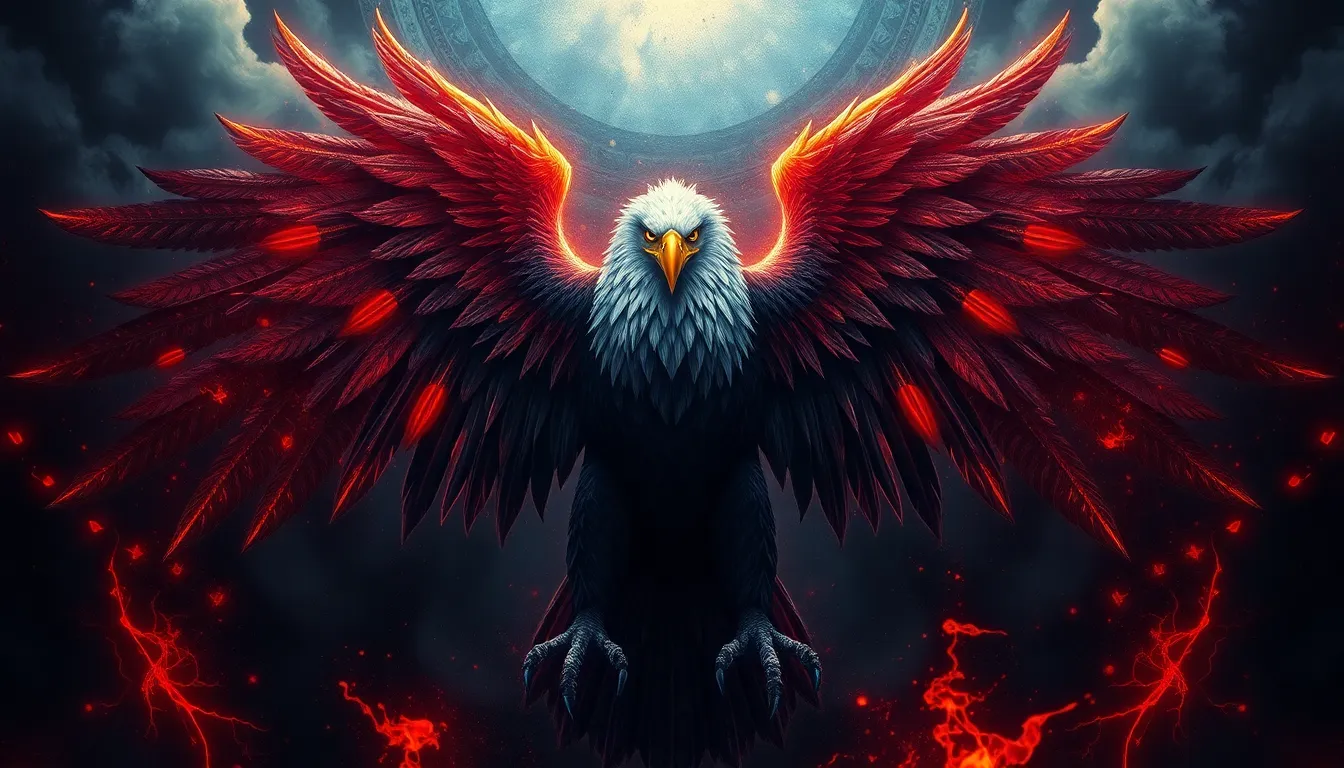The Symbolism of the Eagle in Mythology: Majestic and Powerful
Introduction to Eagle Symbolism
The eagle, with its majestic wingspan and piercing gaze, is a creature that embodies strength, freedom, and divinity across various cultures. Known for its exceptional hunting skills and ability to soar high above the earth, the eagle represents more than just a bird; it symbolizes power and transcendence. In numerous mythologies, the eagle has played a significant role, reflecting humanity’s aspirations and ideals.
This article explores the rich tapestry of eagle symbolism in mythology, examining its characteristics and importance in different cultural contexts. From ancient civilizations to contemporary beliefs, the eagle’s image continues to inspire and resonate with people around the world.
Cultural Significance of Eagles
The eagle has held a prominent place in the lore of various ancient civilizations, where it was often revered for its qualities. Below are some notable examples:
- Egypt: In ancient Egypt, the eagle was associated with the sun god Ra, symbolizing protection and power.
- Greece: The eagle was considered a sacred bird of Zeus, the king of the gods, representing authority and divine intervention.
- Rome: The Roman legions carried the eagle as their standard, symbolizing strength, courage, and victory in battle.
In modern times, the eagle continues to be a powerful symbol, often associated with national pride and independence, especially in countries like the United States where it serves as a national emblem.
Eagles in Native American Mythology
Among Native American tribes, the eagle holds a special place as a spiritual being. It is often viewed as a messenger between humans and the divine, embodying a connection to the spiritual world. The symbolism of the eagle varies among tribes, with some common themes including:
- Spiritual Connection: The eagle is often seen as a bridge between the earthly realm and the heavens.
- Strength and Courage: Many tribes regard the eagle as a symbol of bravery and resilience.
- Wisdom: The eagle’s keen eyesight is often associated with foresight and wisdom.
Specific tribes, such as the Lakota and the Hopi, have unique myths involving the eagle, celebrating its significance in their culture and belief systems.
The Eagle in Greek and Roman Mythology
In Greek and Roman mythology, the eagle is closely linked to the gods of thunder and sky. The eagle is primarily associated with:
- Zeus: In Greek mythology, the eagle is considered the sacred bird of Zeus, symbolizing his power and authority.
- Jupiter: In Roman mythology, Jupiter, the equivalent of Zeus, also had the eagle as his symbol, representing imperial power.
- Myths of Vengeance: The eagle is often depicted in myths where it avenges wrongs, showcasing its role as an emblem of justice and retribution.
This connection to divine power made the eagle a prominent symbol of imperial authority, reinforcing the idea of rulers being divinely chosen.
Eagles in Asian Mythology
The eagle’s symbolism extends into various Asian cultures, where it is revered for different reasons:
- Chinese Culture: In Chinese mythology, the eagle (often represented as the phoenix) symbolizes strength, courage, and rebirth.
- Indian Mythology: The eagle is often associated with the god Vishnu, representing divine power and protection.
Across different Asian cultures, the eagle signifies strength and resilience, often embodying the spirit of the people and their aspirations.
The Eagle as a Symbol of Freedom and Independence
The eagle’s image is synonymous with freedom and independence, particularly in the context of national symbolism. In the United States, the bald eagle is a powerful emblem of:
- National Identity: The bald eagle represents the ideals of freedom and democracy.
- Mythical Freedom: In various myths, the eagle is depicted as a creature that soars high, symbolizing liberation from earthly constraints.
This association with freedom has had a profound psychological and cultural impact, instilling a sense of pride and patriotism among citizens.
Eagles in Religious Texts and Beliefs
The eagle also features prominently in religious texts, where it is often imbued with symbolic meanings. In Christianity, the eagle is associated with the divine and the heavens:
- Bible: The eagle is mentioned in the Bible, symbolizing renewal and strength, as seen in Isaiah 40:31.
- Spiritual Implications: In various faiths, the eagle represents a connection to the divine, often seen as a creature that ascends to the heavens.
This spiritual significance has cemented the eagle’s place as a revered symbol across multiple religions.
Artistic Representations of Eagles in Mythology
Eagles have been depicted in various artistic forms, from ancient sculptures to modern literature. The portrayal of eagles often reflects their symbolic meanings:
- Ancient Art: In ancient art, eagles are often shown in association with gods and rulers, signifying their divine attributes.
- Literature and Poetry: Eagles are frequently featured in poetry and literature, symbolizing freedom and noble aspirations.
- Famous Artworks: Iconic pieces like John James Audubon’s paintings illustrate the majestic nature of eagles, celebrating their beauty and power.
This artistic representation serves to keep the symbolism of the eagle alive in contemporary culture.
The Eagle in Contemporary Culture
In today’s society, the eagle continues to be a prominent figure in media and popular culture. Its symbolism influences various aspects of life:
- Media: The eagle often appears in films, television shows, and literature, symbolizing heroism and strength.
- Branding: Numerous brands utilize the eagle in their logos to evoke feelings of power and reliability.
- National Identity: The perception of the eagle as a national emblem continues to evolve, reflecting changing societal values.
The eagle remains a powerful symbol that resonates with people, connecting them to ideals of freedom, strength, and divinity.
Conclusion: The Enduring Legacy of Eagle Symbolism
The symbolism of the eagle is multifaceted and deeply ingrained in various mythologies and cultures around the world. From its role as a divine messenger to its representation of freedom and national pride, the eagle continues to inspire and evoke admiration. As societies evolve, the legacy of eagle symbolism remains relevant, reminding us of our aspirations for power, wisdom, and independence. The enduring image of the eagle serves as a testament to the bird’s majestic presence in both mythology and contemporary culture.




